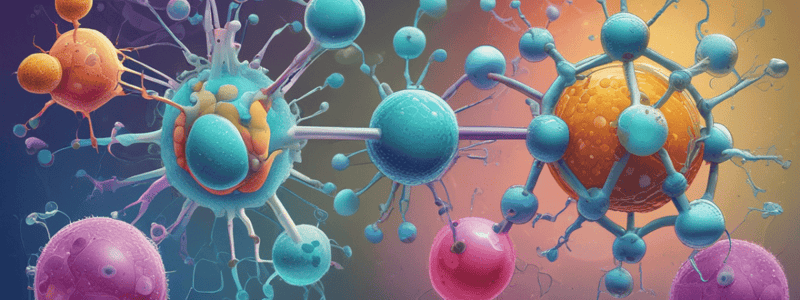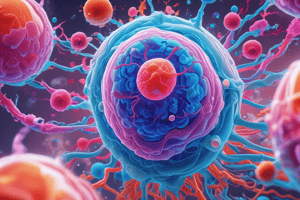Podcast
Questions and Answers
Why do antigens and lymphocytes travel to the lymph nodes?
Why do antigens and lymphocytes travel to the lymph nodes?
- To avoid being detected by the immune system
- To interact with dendritic cells and macrophages for immune response initiation (correct)
- To undergo maturation and differentiation processes
- To directly destroy pathogens present in the lymph nodes
How do rare specific lymphocytes find their specific antigens?
How do rare specific lymphocytes find their specific antigens?
- By passively waiting for antigens to come in contact with them
- By randomly migrating through the lymph nodes until they encounter the antigens
- By recognizing antigens from a distance using specialized receptors
- By following a gradient of chemokines secreted by antigen-presenting cells (correct)
What is the primary function of the peripheral lymphoid tissues?
What is the primary function of the peripheral lymphoid tissues?
- Filtering of lymph and trapping of antigens (correct)
- Production of antibodies
- Digestion of pathogens
- Maturation of T cells
How do lymphocytes enter the lymph nodes?
How do lymphocytes enter the lymph nodes?
Why is it important for lymphocytes to distinguish between self and non-self molecules?
Why is it important for lymphocytes to distinguish between self and non-self molecules?
Where are antigens taken to allow lymphocytes to locate and react rapidly?
Where are antigens taken to allow lymphocytes to locate and react rapidly?
Which cell type picks up antigens of microbes from epithelia and other tissues and transports them to the lymph nodes?
Which cell type picks up antigens of microbes from epithelia and other tissues and transports them to the lymph nodes?
Where do lymph nodes concentrate the antigens of microbes entering through epithelia or colonizing tissues?
Where do lymph nodes concentrate the antigens of microbes entering through epithelia or colonizing tissues?
Which type of cells can present class I MHC-associated peptides to CD8+ T cells?
Which type of cells can present class I MHC-associated peptides to CD8+ T cells?
Where do protein antigens of microbes that live in the cytoplasm of infected cells enter for antigen processing?
Where do protein antigens of microbes that live in the cytoplasm of infected cells enter for antigen processing?
What happens to pathogens once they are ingested by antigen-presenting cells (APCs)?
What happens to pathogens once they are ingested by antigen-presenting cells (APCs)?
In the context of antigen presentation, what is required for antigens to be presented on MHCI?
In the context of antigen presentation, what is required for antigens to be presented on MHCI?
What is the role of classical DCs in the immune response?
What is the role of classical DCs in the immune response?
How are classical DCs activated for migration to lymph nodes?
How are classical DCs activated for migration to lymph nodes?
What is the role of inflammatory cytokines in activating classical DCs?
What is the role of inflammatory cytokines in activating classical DCs?
What directs DCs towards lymph nodes during the immune response?
What directs DCs towards lymph nodes during the immune response?
How do antigens and APCs enter the lymph nodes?
How do antigens and APCs enter the lymph nodes?
Where do B cells primarily go in the lymph nodes?
Where do B cells primarily go in the lymph nodes?
What is the function of M cells in the mucosal immune system?
What is the function of M cells in the mucosal immune system?
Where are T lymphocytes concentrated in the spleen?
Where are T lymphocytes concentrated in the spleen?
What is the role of dendritic cells and macrophages in the spleen?
What is the role of dendritic cells and macrophages in the spleen?
What is the main role of high endothelial venules (HEV) in lymph nodes?
What is the main role of high endothelial venules (HEV) in lymph nodes?
Where do most immune cells reside in cutaneous and mucosal immune tissues?
Where do most immune cells reside in cutaneous and mucosal immune tissues?
What percentage of the body's lymphocytes are typically found in cutaneous and mucosal tissues?
What percentage of the body's lymphocytes are typically found in cutaneous and mucosal tissues?
What role do cells in the lamina propria play in mucosal immune tissues?
What role do cells in the lamina propria play in mucosal immune tissues?
Flashcards are hidden until you start studying




